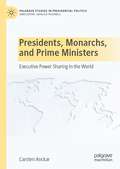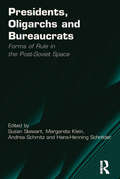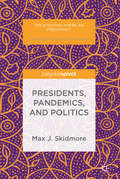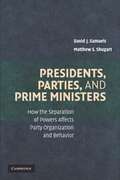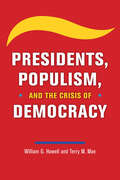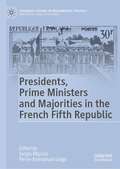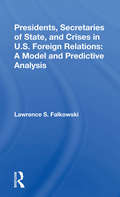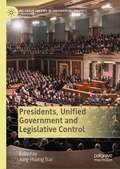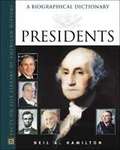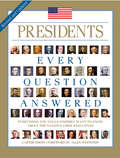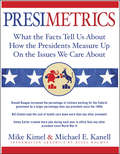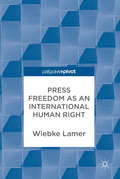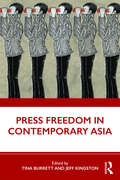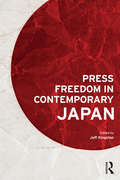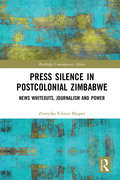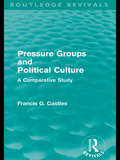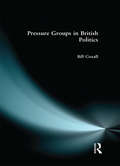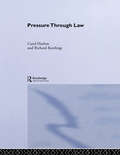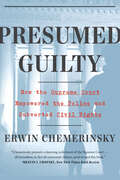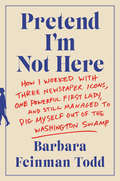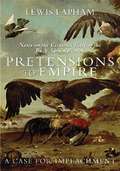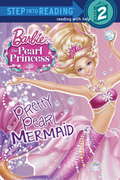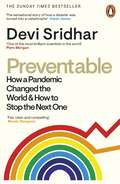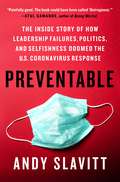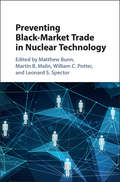- Table View
- List View
Presidents, Monarchs, and Prime Ministers: Executive Power Sharing in the World (Palgrave Studies in Presidential Politics)
by Carsten AnckarDuring the last three decades, there has been a growing interest in systems that combine elements of parliamentarism and presidentialism. Despite the fact that much attention has been directed towards the semi-presidential form of government in particular, it is evident that many aspects of regime forms remain unexplored. This book systematically categorises democratic political regimes with a separate head of state and government (including regimes with a monarch and prime minister, and president and PM) globally and over a long historical period 1850–2019. It analyses how regimes with a dual executive emerge and what trajectories they follow. It also explores the stability of these regimes across time and space. An important feature of this endeavour is to address actual powers of the head of state rather than constitutional provisions.
Presidents, Oligarchs and Bureaucrats: Forms of Rule in the Post-Soviet Space
by Margarete Klein Hans-Henning SchröderOver the last decade the "transition paradigm", which is based on the conviction that authoritarian political systems would over time necessarily develop into democracies, has been subjected to serious criticism. The complex political and societal developments in the post-Soviet region in particular have exposed flaws in the claim that a shift from authoritarianism to democracy is inevitable. Using case studies from the post-Soviet region, a broad range of international contributors present an original and innovative contribution to the debate. They explore the character of post-Soviet regimes and review the political transformations they have experienced since the end of the Cold War. Through a combination of theoretical approaches and detailed, empirical analysis the authors highlight the difficulties and benefits of applying the concepts of hybrid regimes, competitive authoritarianism and neopatrimonialism to the countries of the post-Soviet space. Through this in-depth approach the authors demonstrate how "Presidents, Oligarchs and Bureaucrats" in the region lead their countries, examine the sources of their legitimacy and their relationship to the societies they govern and advance the general theoretical debate on regime change and transition paths.
Presidents, Pandemics, and Politics
by Max J. SkidmoreThis book is an examination of the manner in which American presidents respond to pandemics and other public health crises. Skidmore argues that presidential performance in dealing with emergencies and pandemics varies, but those who are informed, focused, and confident that government can work are most likely to be successful. As an example, Gerald Ford's "Swine Flu program" is widely derided as incompetent and politically motivated. Closer examination, however, suggests the contrary, demonstrating the potential of government to act quickly and effectively against public health emergencies, even when facing formidable obstacles. The American government has a mixed record ranging from excellent to unacceptable, even counterproductive, in dealing with emergency threats to life and health. Despite ideological arguments to the contrary, however, governments are important to effective responses, and in the American setting, presidential action is essential.
Presidents, Parties, and Prime Ministers
by David J. Samuels Matthew S. ShugartThis book provides a framework for analyzing the impact of the separation of powers on party politics. Conventional political science wisdom assumes that democracy is impossible without political parties, because parties fulfill all the key functions of democratic governance. They nominate candidates, coordinate campaigns, aggregate interests, formulate and implement policy, and manage government power. When scholars first asserted the essential connection between parties and democracy, most of the world's democracies were parliamentary. Yet by the dawn of the twenty-first century, most democracies had directly elected presidents. Given this, if parties are truly critical to democracy, then a systematic understanding of how the separation of powers shapes parties is long overdue. David J. Samuels and Matthew S. Shugart provide a theoretical framework for analyzing variation in the relationships among presidents, parties, and prime ministers across the world's democracies, revealing the important ways that the separation of powers alters party organization and behavior - thereby changing the nature of democratic representation and accountability.
Presidents, Populism, and the Crisis of Democracy
by William G. Howell Terry M. MoeHas American democracy’s long, ambitious run come to an end? Possibly yes. As William G. Howell and Terry M. Moe argue in this trenchant new analysis of modern politics, the United States faces a historic crisis that threatens our system of self-government—and if democracy is to be saved, the causes of the crisis must be understood and defused. The most visible cause is Donald Trump, who has used his presidency to attack the nation’s institutions and violate its democratic norms. Yet Trump is but a symptom of causes that run much deeper: social forces like globalization, automation, and immigration that for decades have generated economic harms and cultural anxieties that our government has been wholly ineffective at addressing. Millions of Americans have grown angry and disaffected, and populist appeals have found a receptive audience. These are the drivers of Trump’s dangerous presidency. And after he leaves office, they will still be there for other populists to weaponize. What can be done to safeguard American democracy? The disruptive forces of modernity cannot be stopped. The solution lies, instead, in having a government that can deal with them—which calls for aggressive new policies, but also for institutional reforms that enhance its capacity for effective action. The path to progress is filled with political obstacles, including an increasingly populist, anti-government Republican Party. It is hard to be optimistic. But if the challenge is to be met, we need reforms of the presidency itself—reforms that harness the promise of presidential power for effective government, but firmly protect against the fear that it may be put to anti-democratic ends.
Presidents, Prime Ministers and Majorities in the French Fifth Republic: The Complex Dynamics Of The French Fifth Republic (Palgrave Studies in Presidential Politics)
by Sergiu Mişcoiu Pierre-Emmanuel GuigoThis book focuses on the triangle of power dynamics between presidents, prime ministers and parliamentary majorities, and the way it has evolved throughout the French Fifth Republic, the longest-lasting semi-presidential system. What are the main patterns in the functions and interactions of the three institutions? How do the personalities of presidents, prime ministers and leading parliamentarians shape the dynamics of the institutional system and France’s political evolution during each presidential term? To what extent do their ideological and partisan affiliations affect collaboration between key political leaders? How do the dynamics of inter-institutional relations influence the country’s overall stability and progress? And what are the main lessons of the Fifth Republic’s semi-presidential experience for countries that based their institutional systems on the French model?
Presidents, Secretaries Of State, And Crises In U.s. Foreign Relations: A Model And Predictive Analysis
by Lawrence FalkowskiThis book presents a new approach to analyzing the impact of individuals on U.S. foreign policy and reports the results of this analysis for all post-World War II presidents and secretaries of state, including President Carter and Secretary of State Vance. Its compelling but fundamentally simple theme suggests that it may be unnecessary to adopt traditional models of psychology in order to predict the behavior of foreign-policy decision makers. Earlier studies based on these models are either too judgmental to be predictively useful or too abstract to be relevant to the policy process itself. In contrast, the underlying assumption here is that the information necessary to make accurate predictions is more easily obtainable and understandable than once thought. The methods employed to test Dr. Falkowski's predictive model are easy to understand and to replicate. The results indicate a strong relationship between variations in the memories of leaders and their abilities to adopt flexible courses of action when faced with crisis situations. This relationship exists for all presidents and secretaries of state studied, suggesting that it is possible to predict the behavior of new or potential leaders before they are faced with crisis decisions. The implications of these results are far-reaching and might be directly applicable to the selection of new leaders.
Presidents, Unified Government and Legislative Control (Palgrave Studies in Presidential Politics)
by Jung-Hsiang TsaiThis book aims to explain why some presidents are more successful than others in winning the support of legislators during periods of unified government. This book covers five presidential and semi-presidential systems such as France, Indonesia, Mexico, Taiwan, and the U.S. with a wide variety of institutional arrangements and political dynamics. This book elaborates on explaining how institutional factors such as confidence vote, electoral system, candidate nomination and presidential unilateral power influence the ability of presidents to pass their legislative agendas through comparisons across presidential and semi-presidential systems.
Presidents: A Biographical Dictionary
by Neil R. HamiltonThe president of the United States is a highly visible public figure, a bearer of immense responsibility, and the subject of intense scrutiny. He is held accountable for war, economic depression, domestic strife, national security, partisan politics, and overseas conflict. Presidents: A Biographical Dictionary closely examines the hopes and disappointments, the victories and defeats, and the integrity and weaknesses of the men who have held this office. Each of the profiles presented in this book traces the points at which presidential character, the exercise of power, and external events intersect. Presidents presents information suitable for exploratory research or for a casual reading of the history of the United States's chief executives and their legacies. Presidents contains 4 biographies and portraits of all the presidents, a chronology of the life of each president, suggested further reading about each president, an appendix that presents personal facts about the presidents, election results, and details of the presidential cabinets, a general bibliography and an index. Neil A. Hamilton holds a Ph.D. in history from the University of Tennessee and an M.A. and B.A. in history from the University of Miami. He is currently a professor of history at Spring Hill College in Mobile, Alabama. A member of the Author's Guild, Hamilton is the author or coauthor of eight nonfiction books, including The ABC-Clio Companion to the 1960s Counterculture in America and Militias in America: A Reference Handbook.
Presidents: Every Question Answered
by Carter SmithFrom George Washington to Barack Obama, an entertaining and educational overview of our nation’s chief executives.The highest office of our country has been a challenging one to occupy, from the times of a newly found nation to the global power seat it has become. Presidents: Every Question Answered reviews our leaders’ time in office and how their distinct characteristics became evident in the laws and improvements (or regressions) made during their terms. Biographical facts, First Ladies, and the administrative personnel that shared each president’s days are contained in these pages. Whether you’re a history major looking for extra credit, or just curious to know more about the melting pot of the United States, this book will give you insight and answers to your questions.
Presimetrics: What the Facts Tell Us About How the Presidents Measure Up On the Issues We Care About
by Mike Kimel Nigel Holmes Michael E Kanell Michael E. KanellThe authors cut through party bias to present the quantifiable facts about how modern presidents have performed on critical national issuesPoliticians and the media spend a lot of time telling Americans how the presidents and their administrations are performing, but this analysis always skews along party lines. In Presimetrics, Kimel and Kanell take a fresh look at modern politics by gathering data from numerous government sources in order to compare and rank presidential performance on critical issues, from employment and health care to taxes and family values. The results frequently defy expectations: ? Reagan, godfather of neoconservatives, increased the federal workforce more than any president since LBJ ? Clinton, a hero to Democrats, cut funding for the NEA by a larger percentage than any other president ? Nixon/Ford outperformed all administrations on Democratic issues like Federal spending on social programs The lively text clearly explains how various policies of each administration affect the data, and fascinating information graphics lend even greater depth to the discussion, showing at a glance how multiple administrations stack up.
Press Freedom as an International Human Right
by Wiebke LamerThis book examines why press freedom has not become part of the established international human rights debate, despite its centrality to democratic theory. It argues that an unrestricted press is not just an important economic actor, but also an influential power in the political process, a status that interferes with government interests of sustaining their own power and influence. Despite the popularity of ideational explanations in the field of human rights studies, in the case of promoting press freedom, considerations of power and strategic interests rather than ideas dominate state behavior. The author makes the case that the current place of press freedom in the human rights debate needs to be rethought not only in developing countries, but in liberal democracies as well.
Press Freedom in Contemporary Asia
by Jeff Kingston Tina BurrettThis book analyzes the constraints on press freedom and the ways in which independent reporting and reporters are at risk in contemporary Asia to provide a barometer of democratic development in the region. Based on in-depth country case studies written by academics and journalists, and some who straddle both professions, from across the region, this book explores the roles of mainstream and online media, and how they are subject to abuse by the state and vested interests. Specific country chapters provide up-to-date information on Bangladesh, Kashmir, Malaysia, Myanmar, Nepal, Pakistan, Sri Lanka, Taiwan, Thailand and Vietnam, as well as on growing populist and nationalist challenges to media freedom in the Philippines, India, Indonesia and Japan. The book includes a theoretical chapter pulling together trends and common constraints facing newsrooms across Asia and a regional overview on the impact of social media. Three chapters on China provide insights into the country’s tightening information environment under President Xi Jinping. Moreover, the legal environment of the media, political and external pressures, economic considerations, audience support and journalists’ standards and ethics are explored. As an international and interdisciplinary study, this book will appeal to undergraduates, graduates and scholars engaged in human rights, media studies, democratization, authoritarianism and Asian Studies, as well as Asia specialists, journalists, legal scholars, historians and political scientists.
Press Freedom in Contemporary Japan
by Jeff KingstonIn twenty-first century Japan there are numerous instances of media harassment, intimidation, censorship and self-censorship that undermine the freedom of the press and influence how the news is reported. Since Abe returned to power in 2012, the recrudescence of nationalism under his leadership has emboldened right-wing activists and organizations targeting liberal media outlets, journalists, peace museums and ethnic Korean residents in Japan. This ongoing culture war involves the media, school textbooks, constitutional revision, pacifism and security doctrine. This text is divided into five sections that cover: Politics of press freedom; The legal landscape; History and culture; Marginalization; PR, public diplomacy and manipulating opinion. Press Freedom in Contemporary Japan brings together contributions from an international and interdisciplinary line-up of academics and journalists intimately familiar with the current climate, in order to discuss and evaluate these issues and explore potential future outcomes. It is essential reading for anyone wishing to understand contemporary Japan and the politics of freedom of expression and transparency in the Abe era. It will appeal to students, academics, Japan specialists, journalists, legal scholars, historians, political scientists, sociologists, and those engaged in human rights, media studies and Asian Studies.
Press Silence in Postcolonial Zimbabwe: News Whiteouts, Journalism and Power (Routledge Contemporary Africa)
by Zvenyika Eckson MugariThis book focuses on news silence in Zimbabwe, taking as a point of departure the (in)famous blank spaces (whiteouts) which newspapers published to protest official censorship policy imposed by the Rhodesian government from the mid-1960s to the end of that decade. Based on archived news content, the author investigates the cause(s) of the disappearance of blank spaces in Zimbabwe’s newspapers and establishes whether and how the blank spaces may have been continued by stealth and proposes a model of doing journalism where news is inclusive, just and less productive of blank spaces. The author explores the broader ramifications of news silences, tacit or covert on society’s sense of the world and their place in it. It questions whether and how news media continued with the practice of epistemic deletions and continue to draw on the colonial archive for conceptual maps with which to define and interpret contemporary postcolonial realities and challenges in Zimbabwe. This book will be of interest to scholars, researchers and academics researching the press in contemporary Africa, critical media analysis, media and society studies, and news as discourse.
Pressure Groups and Political Culture: A Comparative Study (Routledge Revivals)
by Francis CastlesThis volume, first published in 1967, offers a new approach to the study of pressure groups, whose importance in the British political system has been increasingly recognised in recent years. Francis Castles seeks to throw light on this topic, firstly by examining the theoretical approaches to an understanding of their role in the political process and secondy by presenting a number of specific studies. For the first time, in one small volume, the reader can become acquainted with pressure groups in continental Europe, Scandinavia, the United States, the totalitarian countries, and the emergent nations. The study is comprehensive in itself and also an invaluable guide to more detailed work in this field of political science.
Pressure Groups in British Politics
by W.N. CoxallPressure groups are an important influence on modern politics, with people feeling strongly about single issues, willing to protest, lobby and petition for their cause.
Pressure Through Law
by Richard Rawlings Carol HarlowGroup litigation has been recognised by political scientists in the States as a useful method of gaining ground and attracting publicity for pressure groups since the turn of the century. In Britain however, recognition that the courts fill such a role has come more slowly. Despite this lack of recognition, pressure through law is far from a modern phenomenon. As the authors show, such cases can be identified in Britain as early as 1749 when abolitionists used the court to test conflicting views of slavery in common law. This book looks at the extent to which pressure groups in Britain use litigation, presenting a view of the courts as a target for campaigners and a vehicle for campaigning. It begins with a description of the tradition of pressure through law in Britain, tracing the development of a parallel tradition in the United States, which has been influential in shaping current British attitudes. The authors analyse the significance of the political environment in Britain in test-case strategy. In contrast with America, Britain has no written constitution and no Bill of Rights and its lack of Freedom of Information legislation makes both litigation and the monitoring of its effects very difficult. However, the centralised character of the British government means that the effects of lobbying are rather more visible in the corridors of power. The authors examine a large number of case studies in order to analyse current practice, and they look at the rapidly changing European and international scene, discussing transnational law, the European community and the Council of Europe. They also look at the campaign tactics of global organisations such as Amnesty and Greenpeace. Carol Harlow and Richard Rawlings are experienced in public law and familiar with political science literature. They are therefore able to relate legal systems to the political process, in a book designed to be accessible and important to lawyers, to political scientists and to lobby group activists.
Presumed Guilty: How The Supreme Court Empowered The Police And Subverted Civil Rights
by Erwin ChemerinskyAn unprecedented work of civil rights and legal history, Presumed Guilty reveals how the Supreme Court has enabled racist policing and sanctioned law enforcement excesses through its decisions over the last half-century. Police are nine times more likely to kill African-American men than they are other Americans—in fact, nearly one in every thousand will die at the hands, or under the knee, of an officer. As eminent constitutional scholar Erwin Chemerinsky powerfully argues, this is no accident, but the horrific result of an elaborate body of doctrines that allow the police and, crucially, the courts to presume that suspects—especially people of color—are guilty before being charged. Today in the United States, much attention is focused on the enormous problems of police violence and racism in law enforcement. Too often, though, that attention fails to place the blame where it most belongs, on the courts, and specifically, on the Supreme Court. A “smoking gun” of civil rights research, Presumed Guilty presents a groundbreaking, decades-long history of judicial failure in America, revealing how the Supreme Court has enabled racist practices, including profiling and intimidation, and legitimated gross law enforcement excesses that disproportionately affect people of color. For the greater part of its existence, Chemerinsky shows, deference to and empowerment of the police have been the modi operandi of the Supreme Court. From its conception in the late eighteenth century until the Warren Court in 1953, the Supreme Court rarely ruled against the police, and then only when police conduct was truly shocking. Animating seminal cases and justices from the Court’s history, Chemerinsky—who has himself litigated cases dealing with police misconduct for decades—shows how the Court has time and again refused to impose constitutional checks on police, all the while deliberately gutting remedies Americans might use to challenge police misconduct. Finally, in an unprecedented series of landmark rulings in the mid-1950s and 1960s, the pro-defendant Warren Court imposed significant constitutional limits on policing. Yet as Chemerinsky demonstrates, the Warren Court was but a brief historical aberration, a fleeting liberal era that ultimately concluded with Nixon’s presidency and the ascendance of conservative and “originalist” justices, whose rulings—in Terry v. Ohio (1968), City of Los Angeles v. Lyons (1983), and Whren v. United States (1996), among other cases—have sanctioned stop-and-frisks, limited suits to reform police departments, and even abetted the use of lethal chokeholds. Written with a lawyer’s knowledge and experience, Presumed Guilty definitively proves that an approach to policing that continues to exalt “Dirty Harry” can be transformed only by a robust court system committed to civil rights. In the tradition of Richard Rothstein’s The Color of Law, Presumed Guilty is a necessary intervention into the roiling national debates over racial inequality and reform, creating a history where none was before—and promising to transform our understanding of the systems that enable police brutality.
Pretend I'm Not Here: How I Worked with Three Newspaper Icons, One Powerful First Lady, and Still Managed to Dig Myself Out of the Washington Swamp
by Barbara Feinman ToddAn accomplished former ghostwriter and book researcher who worked with Bob Woodward, Carl Bernstein, Ben Bradlee, and Hillary Clinton goes behind-the-scenes of the national’s capital to tell the story of how she survived the exciting, but self-important and self-promoting world of the Beltway.Barbara Feinman Todd has spent a lifetime helping other people tell their stories. In the early 1980s, she worked for Bob Woodward, first as his research assistant in the paper’s investigative unit and, later, as his personal researcher for Veil, his bestselling book about the CIA. Next she helped Carl Bernstein, who was struggling to finish his memoir, Loyalties. She then assisted legendary editor Ben Bradlee on his acclaimed autobiography A Good Life, and she worked with Hillary Clinton on her bestselling It Takes a Village. Feinman Todd’s involvement with Mrs. Clinton made headlines when the First Lady neglected to acknowledge her role in the book’s creation, and later, when a disclosure to Woodward about the Clinton White House appeared in one of his books. These events haunted Feinman Todd for the next two decades until she confronted her past and discovered something startling.Revealing what it’s like to get into the heads and hearts of some of Washington’s most compelling and powerful figures, Feinman Todd offers authentic portraits that go beyond the carefully polished public personas that are the standard fare of the Washington publicity factory. At its heart, Pretend I’m Not Here is a funny and forthcoming story of a young woman in a male-dominated world trying to find her own voice while eloquently speaking for others.
Pretensions to Empire: Notes on the Criminal Folly of the Bush Administration
by Lewis LaphamLapham stands virtually alone among mainstream American journalists in having consistently seen through the fog of lies and narcissism surrounding the Bush administration from its earliest days in Washington.
Pretty Pearl Mermaid (Barbie: The Pearl Princess)
by Jennifer Liberts WeinbergGirls ages 4 to 6 will love learning to read on their own with this Step 2 Step into Reading leveled reader based on Barbie®'s latest film.
Preventable: How a Pandemic Changed the World & How to Stop the Next One
by Devi Sridhar**THE SUNDAY TIMES BESTSELLER | BBC RADIO 4 BOOK OF THE WEEK**The definitive story of COVID-19 and how global politics shape our health - from a world-leading expert and the pandemic's go-to science communicator Professor Devi Sridhar has risen to prominence for her vital roles in communicating science to the public and speaking truth to power. In Preventable she highlights lessons learned from outbreaks past and present in a narrative that traces the COVID-19 pandemic - including her personal experience as a scientist - and sets out a vision for how we can better protect ourselves from the inevitable health crises to come.In gripping and heartfelt prose, Sridhar exposes the varied realities of those affected and puts you in the room with key decision makers at crucial moments. She vibrantly conveys the twists and turns of a plot that saw: deadlier varients emerge (contrary to the predictions of social media pundits who argued it would mutate to a milder form); countries with weak health systems like Senegal and Vietnam fare better than countries like the US and UK (which were consistently ranked as the most prepared); and the quickest development of game-changing vaccines in history (and their unfair distribution)Combining science, politics, ethics and economics, this definitive book dissects the global structures that determine our fate, and reveals the deep-seated economic and social inequalities at their heart - it will challenge, outrage and inspire.'A brutally compelling reminder that if voices like Devi's had been listened to, so many more could have lived' OWEN JONES'One of the most brilliant scientists in the world who has been proven consistently right in this crisis' PIERS MORGAN'Excellent . . . Fair, clear and compelling' NICOLA STURGEON'Those who have found Professor Devi Sridhar's expertise and calm advice invaluable since the arrival of Covid-19 will be glad to know that she has written Preventable' RACHEL COOKE, Guardian, Non-fiction to look out for in 2022
Preventable: The Inside Story of How Leadership Failures, Politics, and Selfishness Doomed the U.S. Coronavirus Response
by Andy Slavitt* NATIONAL BESTSELLER *“Painfully good. The book could have been called, ‘Outrageous.’ The story Andy Slavitt tells is not just about Trump’s monumental failures but also about the deeper ones that started long before, with our health system, our politics, and more.” --Atul Gawande, author of Being Mortal The definitive, behind-the-scenes look at the U.S. Coronavirus crisis from one of themost recognizable and influential voices in healthcareFrom former Biden Senior Advisor Andy Slavitt, Preventable is the definitive inside account of the United States' failed response to the Coronavirus pandemic. Slavitt chronicles what he saw and how much could have been prevented -- an unflinching investigation of the cultural, political, and economic drivers that led to unnecessary loss of life.With unparalleled access to the key players throughout the government on both sides of the aisle, the principal public figures, as well as the people working on the frontline involved in fighting the virus, Slavitt brings you into the room as fateful decisions are made and focuses on the people at the center of the political system, health care system, patients, and caregivers. The story that emerges is one of a country in which -- despite the heroics of many -- bad leadership, political and cultural fractures, and an unwillingness to sustain sacrifice light a fuse that is difficult to extinguish. Written in the tradition of The Big Short, Preventable continues Andy Slavitt’s important work of addressing the uncomfortable realities that brought America to this place. And, he puts forth the solutions that will prevent us from being here again, ensuring a better, stronger country for everyone.
Preventing Black-Market Trade in Nuclear Technology
by Matthew Bunn William C. Potter Martin B. Malin Leonard S. SpectorEvery nuclear weapons program for decades has relied extensively on illicit imports of nuclear-related technologies. This book offers the most detailed public account of how states procure what they need to build nuclear weapons, what is currently being done to stop them, and how global efforts to prevent such trade could be strengthened. While illicit nuclear trade can never be stopped completely, effective steps to block illicit purchases of nuclear technology have sometimes succeeded in slowing nuclear weapons programs and increasing their costs, giving diplomacy more chance to work. Hence, this book argues, preventing illicit transfers wherever possible is a key element of an effective global non-proliferation strategy.
